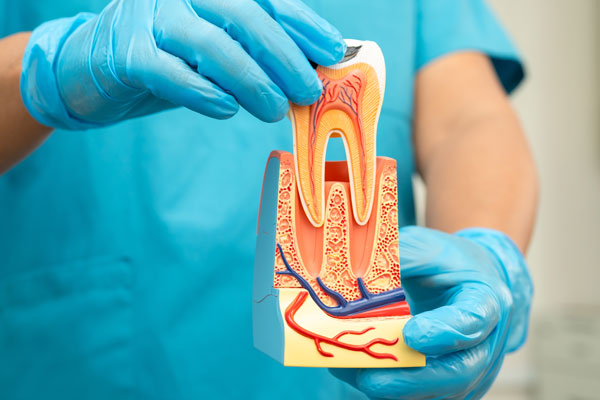Pros and Cons of Root Canal Treatment

If your tooth’s pulp is infected or inflamed, your dentist might recommend root canal treatment. Before you schedule your appointment, you need to learn the pros and cons of root canals. After you understand the benefits and drawbacks, you can make an informed decision. Then you will be ready to schedule a procedure.
Benefits and drawbacks of root canal treatment
When people have a severely damaged or infected tooth, it is critical to take action. Many choose between root canal treatment and extraction. It is easier to select between the two by looking at the advantages and disadvantages of a root canal. After weighing the pros and cons, patients can make a decision.
Pro – keep the natural tooth
Root canal treatment allows patients to keep the natural tooth. Dentists remove the infected or inflamed pulp tissue, clean out the root canal and replace it with filling material. By keeping the natural tooth, patients do not have to worry about bone loss. The tooth’s root will continue to stimulate the bone, so people can maintain natural smiles.
Con – treatment might weaken the tooth
It is possible for a tooth to become weaker after a root canal. Dentists must drill through the tooth to get to the pulp, and additional decay might need to be removed. If the tooth is too weak to function, the dentist will add a crown to it. This will strengthen the tooth and allow the patient to use it like a natural tooth.
Pro – stop toothaches
When the pulp is infected or inflamed, it is quite painful. Toothaches make it difficult to function. Many people have a difficult time even going to work or enjoying a TV show. A root canal treatment cleans out the infection or inflamed pulp, and the area is treated with antibiotics if needed. Once the infection is gone, the toothache disappears.
Con – sometimes multiple appointments are needed
In some cases, patients only need to go to the dentist once to get a root canal. However, two to three appointments are required in complicated cases where the infection or damage is severe. Also, patients might need two to three visits to get root canals on upper first molars. Upper first molars have three to five root canals, and each one must be treated. This takes longer to complete.
Pro – prevent gaps in the mouth
Patients who choose extractions over root canals have to worry about gaps in the mouth. Teeth move to fill in the gaps. This can lead to alignment issues in the mouth and can make eating difficult. With root canal treatment, the teeth stay in place, so alignment issues are not a concern.
Do you need root canal treatment?
A root canal will allow you to keep your natural tooth, stop your toothache in its tracks and prevent gaps in your mouth. However, it could weaken your tooth, and you might need to schedule two to three appointments. Weigh the pros and cons and talk to your dentist. Your dentist will help you make a decision regarding your oral care.
Request an appointment here: https://alexoldtowndental.com or call Alexandria Old Town Dental at (703) 763-1078 for an appointment in our Alexandria office.
Check out what others are saying about our services on Yelp: Read our Yelp reviews.
Related Posts
Dentists employ a root canal to save a badly damaged or infected tooth. When decay, injury, or infection affects the soft tissue inside a tooth, known as the pulp, a root canal is often the best way to fix it. This treatment relieves pain and protects the tooth from further damage. Knowing what to expect…
There are many options available for dental restorations, and it is important to be informed about the procedures and treatment plans involved before committing to one. Typically, a patient will have a consultation with a dental professional prior to having any work done. This type of appointment is an ideal time to ask questions and…
Crowns are commonly used in dental restorations. A crown is a cap shaped like a tooth but hollow in the middle. It fits over a natural tooth that has to be prepared first. Depending on the issue it is correcting, a crown can be used by itself or as a component of another restoration technique.Teeth…
Numerous things can interfere with a good smile. Whether it is a missing, cracked, chipped, damaged, or decayed tooth, dental restorations help improve how you look, prevent future dental issues, and improve the function of your teeth and mouth. Depending on the type and severity of the issue, there are various restoration procedures available.Some people…


